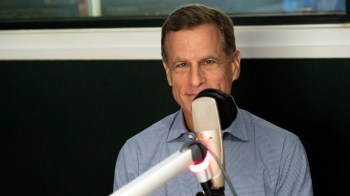Keeping the sick economy stable
TEXT OF STORY
Kai Ryssdal: So much for what Ben Bernanke and the Fed said about the economy today. The big unknown is what they’re going to do about it. To pick up where Steve left off we’ve called Dan Greenhaus. He’s the chief economic strategist with Miller Tabak. Good to have you with us.
DAN GREENHAUS: Thank you for having me.
RYSSDAL: Let me make sure I have the general idea here. You know the Fed has been sticking its fingers in the economic dike for the last two years, trying to stop the system from collapsing. And what they have to do now is figure out a way to pull those fingers out one by one to make it not collapse when they do that, yeah?
GREENHAUS: I’ve never heard that analogy before, but it makes a fair amount of sense to me, yes.
RYSSDAL: Now comes the tough part. How are they going to do that?
GREENHAUS: Well, it’s certainly not an easy process. I don’t think anybody would assert that. But more important than anything, it’s not a process that we have a blueprint for how it should go, and I think that’s one of the largest problems for the Fed. And to a large degree we’re flying blind here.
RYSSDAL: What then do you think is the very first thing the Fed is going to do?
GREENHAUS: Well, you know, everybody keeps looking for the Fed to mention or to hike rates. But there’s a couple of other things that they can do prior to that that would set the tone or perhaps prepare the landscape for an eventual rate hike. One of the first things they have to do is sort of an academic exercise, which is that they will increase the rate that they pay banks on the amount of money that banks have on deposits with the Fed. Without getting too technical, what this is effectively going to do is stop banks from lending as much money out, so people who are concerned about inflation can take heart in the fact that the Fed is already taking steps before they’ve actually raised rates. But the larger concern, as you mentioned earlier, is what the Fed is going to do with treasuries and $1.25 trillion worth of mortgage-backed securities that they would have accumulated by the time this is over.
RYSSDAL: Because they have so much on their books now, getting that back into the marketplace in one fell swoop would obviously be a horrible thing.
GREENHAUS: They can’t just turn to their primary dealers, and say, OK, we’ve accumulated $300 billion, now we’re going to sell them right back to you. That’s going to be quite problematic for the private marketplace. They’re going to have to do this over time. And they’re going to have to do so the market can absorb the treasuries that they’ve purchased in a manner that doesn’t necessarily adversely affect interest rates.
RYSSDAL: Market psychology is always a tricky thing. What do you think the reaction is going to be on that day when the Fed comes out and says, OK, here we go, we’re going to start selling stuff off, slowly, but we’re going to sell.
GREENHAUS: If I had to guess, I think one of the most important takeaways from that moment, from that announcement, is going to be that the Fed has more or less given the green light to the idea that economic growth is sufficient now, or sustainable enough now to stand on its own two legs. And as such the Fed can begin taking steps to remove the liquidity that it injected, to return this liquidity back to their coffers and take it away from the marketplace.
RYSSDAL: Your advice to the Fed chairman then is slow but steady.
GREENHAUS: Well, you know, far be it from me to think the Fed needs advice from anybody. What I could suggest to him, absent any need for economic advice, is to keep going with respect to his reaching out to the public. He did a nearly unprecedented interview with 60 Minutes. A town hall meeting where the general public got to speak to a Fed chairman. This is incredibly unprecedented steps for a sitting Fed chairman to take. And if I could give him any advice it would to keep doing that. And his desire to get out there and talk to the general public is going to be instrumental in explaining to people exactly what he’s doing and why he’s doing it.
RYSSDAL: Dan Greenhaus. He’s the chief economic strategist at Miller Tabak. It’s a trading firm in New York City. Dan, thanks a lot.
GREENHAUS: Thank you for having me.
There’s a lot happening in the world. Through it all, Marketplace is here for you.
You rely on Marketplace to break down the world’s events and tell you how it affects you in a fact-based, approachable way. We rely on your financial support to keep making that possible.
Your donation today powers the independent journalism that you rely on. For just $5/month, you can help sustain Marketplace so we can keep reporting on the things that matter to you.


















